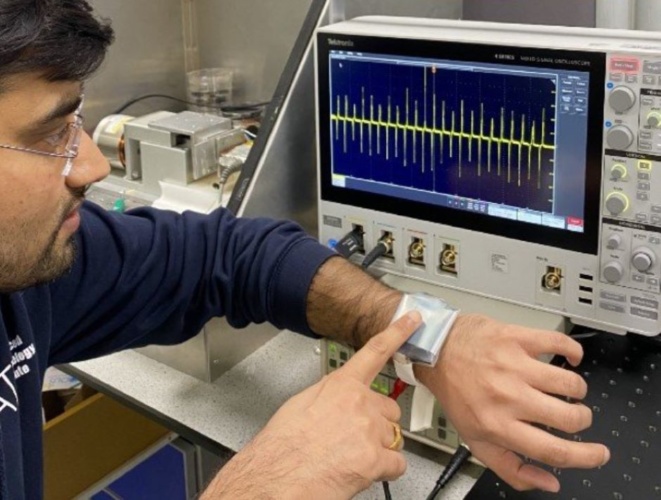
The prototype device can transmit Morse code, and the team at Surrey University is now focusing on plans to use this technology in smart watches.
"Our research demonstrates that there is a path to creating sustainable technology that runs on electricity powered by us, the users of that technology,” said Dr Bhaskar Dudem, project lead and Research Fellow at Surrey University's Advanced Technology Institute (ATI).
Surrey's device is 'self-powered' thanks to materials that become electrically charged after they come into contact with one another. These Triboelectric Nanogenerators (TENGs) use static charge to harvest energy from movement through electrostatic induction.
MORE FROM ELECTRONICS & COMMUNICATIONS
“We didn’t perform any special processing of waste materials, except the hot-pressing treatment of the plastic lid of a coffee cup,” Dr Dudem told The Engineer. “The tissue paper was directly coated with the carbon nanoparticles by brush coating without any processing treatment.”
He added that the electrical output voltage and current in the range of 10-50V and 200-300nA were observed in the wearable device.
The developers believe their energy-harvesting wearable device could have applications in the consumer, medical and security sectors.
“We can utilise these products as pressure sensors to detect human body activities, which can help to use it for various health care applications.” said Dudem. "In this work we have developed a 9-segment display using the waste materials-based TENGs, which was operated by actuating the right devices to display the numbers on a computer screen with the help of an Arduino board for security and user identification applications. Among the information and communication devices, the Morse code transmitter functionality of the proposed device can also play a major role in security applications.”
He added: “If any company shows interest in this proposal, we will definitely consider it to take from the lab to market.”
The research is published in ACS Applied Materials & Interfaces.










Comment: Hydrogen requires a long-term mindset
I'm fairly certain there were plenty of nay sayers in the early 19th century that refused to see the benefits of railways and steam power and...